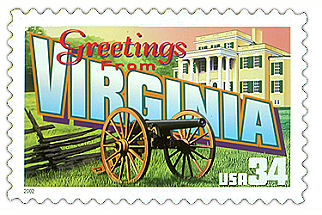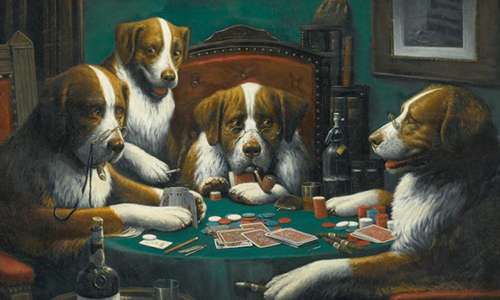Virginia Poker Bill Passes Senate
Just days after passing through a Virginia Senate committee, a bill which would legalize poker in the Commonwealth of Virginia was passed by the state Senate. The vote, taken on Friday after the bill’s third required reading, was actually a 19-19 tie, but the Senate Chair cast the deciding vote in favor of the bill’s passage.
SB 1400 was introduced by Senator Louise Lucas on January 11th, so it has moved fairly quickly. It amends the Commonwealth’s gaming laws to classify poker as a game of skill and therefore not “illegal gambling.”
Here is the definition of illegal gambling as it stands right now:
“Illegal gambling” means the making, placing or receipt of any bet or wager in the Commonwealth of money or other thing of value, made in exchange for a chance to win a prize, stake or other consideration or thing of value, dependent upon the result of any game, contest or any other event the outcome of which is uncertain or a matter of chance, whether such game, contest or event occurs or is to occur inside or outside the limits of the Commonwealth.
Lucas’ bill adds the sentence, “Poker games shall be deemed games of skill, and nothing in this subdivision shall be construed to make any such game illegal gambling.”
The bill also sets out a regulatory framework for land-based poker tournaments, placing them under the watch of the Department of Agriculture and Consumer Services while the Charitable Gaming Board gets to set the rules.
 The Virginia State Senators who voted for the bill were: George Barker, William DeSteph, Jr., Rosalyn Dance, Adam Ebbin, John Edwards, Barbara Favola, Janet Howell, Lynwood Lewis, Jr., Marnie Locke, Louise Lucas, David Marsden, Monty Mason, Jennifer McClellan, Jeremy McPike, J. Chapman Petersen, Richard Saslaw, Lionell Spruill, Sr., Scott Surovell, and Jennifer Wexton.
The Virginia State Senators who voted for the bill were: George Barker, William DeSteph, Jr., Rosalyn Dance, Adam Ebbin, John Edwards, Barbara Favola, Janet Howell, Lynwood Lewis, Jr., Marnie Locke, Louise Lucas, David Marsden, Monty Mason, Jennifer McClellan, Jeremy McPike, J. Chapman Petersen, Richard Saslaw, Lionell Spruill, Sr., Scott Surovell, and Jennifer Wexton.
The Senators who voted against it were: Richard Black, Charles Carrico, Sr., A. Benton Chaffin, Amanda Chase, Siobhan Dunnavant, Emmett Hanger, Jr., Ryan McDougle, Stephen Newman, Thomas Norment, Jr., Mark Obenshain, Mark Peake, Bryce Reeves, Frank Ruff, Jr., William Stanley, Jr., Richard Stuart, Glen Sturtevant, Jr., David Suetterlein, Jill Holtzman Vogel, and Frank Wagner.
John Cosgrove, Jr. and R. Creigh Deeds did not vote.
Of note, aside from the fact that there are A LOT of Juniors and Seniors in the Virginia Senate, the vote was split almost directly down party lines with Democrats siding in favor of legalizing poker. The only exception was William DeSteph, Jr., who broke from his fellow Republicans and voted for the bill. Guess who wasn’t invited to happy hour on Friday?
While there are certainly arguments that could be made against legalizing poker and poker tournaments in Virginia, one might wonder why the vote was so strictly partisan. Odds are, the reason was purely political, but it would be nice to know if there was not only some intelligent opposing opinion, but also a reason why all but one Republican held such a view, if it wasn’t just politics.
Democratic Lieutenant Governor Ralph Northam is the presiding officer of the Virginia Senate and therefore is the person who is tasked with casting tiebreaking votes. Thus, he apparently broke the tie, allowing the bill to pass the Senate.
From here, Senator Lucas’ bill moves on to the Virginia House of Delegates, where it will go through a similar process. It will be assigned to a committee, which will have the opportunity to amend the bill. If the committee reports (read: approves) the bill, it will be required to have three readings on three separate days in front of the full House. The first is pretty basic, an introduction so to speak, while the second reading is the one when Delegates can suggest amendments. If the bill passes the second reading, it then moves on to the third reading and a House vote.
All three readings in the Senate occurred last week. It won’t necessarily be that fast in the House if it gets that far, but one would think that the speed at which the bill moved through the Senate is a good sign.
One would think. If it does get to a House vote, it looks like it could be rough sledding, as there are 66 Republicans to only 34 Democrats in the House. If the voting comes even remotely close to going down party lines again – with Republicans voting against it – SB 1400 doesn’t stand much of a chance.
The Senate, for comparison is almost even, with 21 Republicans and 19 Democrats. One member of each party didn’t vote, so that left 20 Republicans and 18 Democrats voting. Since one Republican took up with the Democrats a tie was produced.
The bill is already on the House calendar, scheduled to hit the Committee on General Laws tomorrow.



















COMMENTS